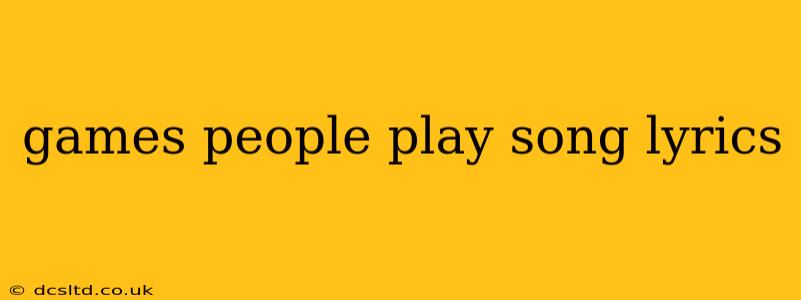The iconic song "Games People Play," made famous by Joe South, isn't just a catchy tune; it's a poignant reflection on human relationships and the often-unconscious strategies we employ to navigate them. Its enduring popularity stems from the universal truth it reveals: we all play games, sometimes without even realizing it. This exploration dives deep into the lyrics, uncovering their meaning and relevance even decades after their release.
What are the main themes of "Games People Play"?
The central theme revolves around the manipulative and often self-destructive patterns in relationships. South masterfully paints a picture of individuals using emotional strategies, often born from insecurity or fear, to control or influence others. These "games" range from subtle power plays to outright emotional manipulation, all stemming from a lack of genuine communication and vulnerability. The song highlights the cyclical nature of these patterns, showing how these games ultimately hinder true connection and fulfillment.
What are the different types of games described in the song?
While the song doesn't explicitly name specific "games," it alludes to several common relational dynamics. We can interpret these through the lens of transactional analysis, a psychological framework that examines the roles we play in interactions (Parent, Adult, Child). The lyrics suggest games involving:
- One-upmanship: The constant need to be "better than" the other person, often masking insecurities.
- Passive-aggression: Expressing anger or resentment indirectly through subtle actions instead of open communication.
- Emotional blackmail: Using guilt or emotional manipulation to control the other person's behavior.
- Martyrdom: Playing the victim to gain sympathy and control.
What are the consequences of playing these games?
The song subtly but powerfully underscores the negative consequences of engaging in these relational games. These include:
- Isolation: Instead of fostering connection, these games create distance and prevent genuine intimacy.
- Emotional distress: The constant manipulation and power struggles leave individuals feeling drained and unhappy.
- Damaged relationships: The lack of trust and open communication erodes the foundation of healthy relationships.
- Missed opportunities for growth: By avoiding authentic interaction, individuals miss opportunities for self-awareness and personal growth.
How can we stop playing these games?
The song doesn't offer a direct solution, but its message implicitly encourages self-reflection and a shift towards authenticity. Stopping these games requires:
- Self-awareness: Recognizing your own patterns of behavior and the motivations behind them.
- Honest communication: Expressing your needs and feelings directly and openly.
- Empathy: Understanding the other person's perspective and emotions.
- Vulnerability: Allowing yourself to be seen and known without fear of judgment.
What is the overall message of "Games People Play"?
Ultimately, "Games People Play" serves as a cautionary tale about the pitfalls of manipulative relationships. It encourages listeners to examine their own interactions and strive for more genuine and fulfilling connections. The song's enduring power lies in its ability to resonate with anyone who has ever experienced the pain of relational games, offering a subtle but powerful call for authenticity and vulnerability. It's a reminder that true intimacy and happiness lie not in control or manipulation, but in open communication and genuine connection.
